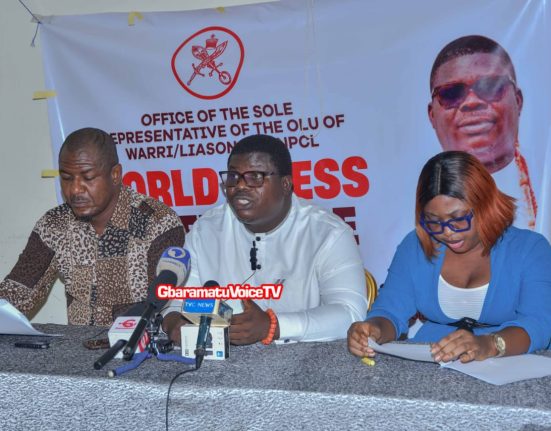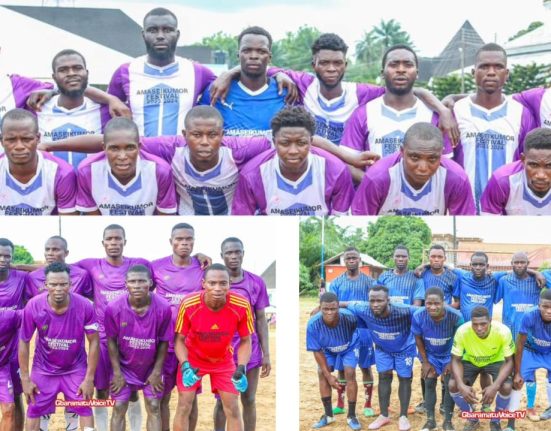By Prof Tosan Blessing
The Olu of Warri remains one of the foremost traditional ruler of the South South. His ancestry pans from the Bini Kingdom whose monarchy extends across the area delineated as the old Warri province. That province today continues to shrink in the light of the growing fervour of ethnic nationalism which ensured that peoples and groups within the old Warri province began tracing their own ancestry and at some point ended up pitching their historical antecedence within the context of the Warri province.
Interestingly, Warri being the major town of the Warri province suddenly became an epicenter of conflict where three ethnic groups Ijaw, Itsekiri and Urhobo together with their cultural planks and historical tapestry began jostling for spheres of influence within the context of this province. But it needs to be told that much of what constituted the indented lines of ownership of any part of the province was drawn majorly from the pattern of trade engagement with the Portuguese rather than from the officialdom of direct acquisition through which contemporary ownership of Lands are consummated.
In which case, the state of a people in terms of their armament and expeditionary activities accounted largely for how they fared with lands ownership in the 18th Century. By alluding to this pattern of ethnic settlement that may have dictated the traumatic experiences culminating into land ownership of the contesting ethnic groups, I do not mean to imply the existence of a vicious circle, an inescapable , inevitability, in historical developments but merely wish to emphasise the correspondence and sequence of events that are often forgotten in polemical debates.
Our views of ourselves necessarily involves comparison and self criticism and at a time when all the world’s is a stage and the development of supersonic flights and social media have brought us all into each others backyards and even bedrooms, we can no longer ignore other people of our merciful universe and those who refuse to learn from others easily become idiots and degenerates.
As a researcher I will not readily dispose existing histories on the pattern of settlement within the Warri province – there are many such views littering our scholarship space but to say plaintively that the Bini kingdom from where the Itsekiris trace its revered traditional institution have tended to show class and leadership within the old Bini province.
There are parts of the old Bini province that was taken over by the Enogies and Otarus and a great many others representing the varying fiefdoms classified through language groupings. This quality of leadership has endeared the throne of the Oba of Bini to a great many traditional and cultural stools in the province and the primacy of the Oba over these stools have never been subjected to polygraph test.
The same term applies to Ife the cradle of Yoruba civilization in how the Oni was able to rein in the pantheon of Yoruba stools to create its own primacy without major cleavages. The same cannot be said of our old Warri province.
While I appreciate the inclusive stance of the Ogiame in creating new vista of relationships with the Ijos seen in the Ogiame sending representatives to the installation of the Pere of Gbaramatu and personally offering the kingdom’s commiseration on the death of the Tunteriwei of Gbaramatu, the same cannot be said of our many title chiefs who see fighting with the Ijos and Urhobo their only inspiration for Chiefdom.
Lets look at it from a simple tangent, the principle of protectionism has never worked anywhere. It is the failure of protectionism to pass the sacrosanct test of culture that created the phenomenon of globalization- although applied squarely in business context globalisation defines the process by which cultures and or other ethnic nationality group engage and develop spheres of cultural influence on an extended scale.
While we can claim that the Itsekiri traditional institution is monolithic, the same cannot be said about our neighbours in the West and East. Such cultural restraints on the Itsekiris and the inadvertent surge in the multiplicity of cultural outlets of the other groups will create a phenomenon of extension of spheres of influence and redrawing of the map of settlement in the old province.
These are truths that we must live with. In the context of these truths, rather than present the Itsekiri institution as enemy of progress we must seek to interface with all the existing cultural element in the province with a view to present the Ogiame stool as the paternal stool.
The very idea that the Itsekiri cannot articulate its view within the context of development and imperative of trans cultural influence that will enhance its sphere of influence and the stool of the Ogiame except to publicly attack the cognomen of the Nigerian Maritime University is frankly worrisome. It only showed that we have not learnt from the consequences of the Warri crisis. It also further showed the Itsekiri ethnic people as antagonistic of their neighbours for whom nothing good should be said of.
I request for a re-adjustment of our approach as it is not going to work,. The Dukes of the Warri kingdom must respect the stool of the Ogiame and follow his body language.
The Ijaws and Urhobos remain natural neighbours and there is nothing anyone can do about it.
We must begin to practice inclusion and within that term advance the institutional relevance of the stool- the Olu of Warri. Anything short of this is a call to anarchy which will present an avoidable ill wind that carries no moss.
Prof Tosan Blessing Harriman, wrote from Kano, Nigeria
Support Quality Journalism in the Niger Delta Region
Join us in our mission to bring development journalism, cultural preservation, and environmental awareness to the forefront. Your contribution makes a difference in the lives of the people of the Niger Delta. Donate today and be a part of the change!










Leave feedback about this
You must be logged in to post a comment.